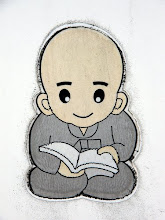第一品 法会因由分
如是我闻,一时,佛在舍卫国祗树给孤独园,与大比丘众千二百五十人俱。尔时,世尊食时,著衣持钵,入舍卫大城乞食。于其城中,次第乞已,还至本处。饭食讫,收衣钵,洗足已,敷座而坐。
第二品 善现启请分
时,长老须菩提在大众中即从座起,偏袒右肩,右膝着地,合掌恭敬而白佛言:“希有!世尊!如来善护念诸菩萨,善付嘱诸菩萨。世尊!善男子、善女人,发阿耨多罗三藐三菩提心,应云何住,云何降伏其心?”佛言:“善哉,善哉。须菩提!如汝所说,如来善护念诸菩萨,善付嘱诸菩萨。汝今谛听!当为汝说:善男子、善女人,发阿耨多罗三藐三菩提心,应如是住,如是降伏其心。”“唯然,世尊!愿乐欲闻。”
第三品 大乘正宗分
佛告须菩提:“诸菩萨摩诃萨应如是降伏其心!所有一切众生之类:若卵生、若胎生、若湿生、若化生;若有色、若无色;若有想、若无想、若非有想非无想,我皆令入无余涅盘而灭度之。如是灭度无量无数无边众生,实无众生得灭度者。何以故?须菩提!若菩萨有我相、人相、众生相、寿者相,即非菩萨。”
第四品 妙行无住分
“复次,须菩提!菩萨于法,应无所住,行于布施,所谓不住色布施,不住声香味触法布施。须菩提!菩萨应如是布施,不住于相。何以故?若菩萨不住相布施,其福德不可思量。须菩提!于意云何?东方虚空可思量不?”“不也,世尊!”“须菩提!南西北方四维上下虚空可思不?”“不也,世尊!”“须菩提!菩萨无住相布施,福德亦复如是不可思量。须菩提!菩萨但应如所教住。”
第五品 如理实见分“须菩提!于意云何?可以身相见如来不?”“不也,世尊!不可以身相得见如来。何以故?如来所说身相,即非身相。”佛告须菩提:“凡所有相,皆是虚妄。若见诸相非相,则见如来。”
第六品 正信希有分须菩提白佛言:“世尊!颇有众生,得闻如是言说章句,生实信不?”佛告须菩提:“莫作是说。如来灭后,后五百岁,有持戒修福者,于此章句能生信心,以此为实,当知是人不于一佛二佛三四五佛而种善根,已于无量千万佛所种诸善根,闻是章句,乃至一念生净信者,须菩提!如来悉知悉见,是诸众生得如是无量福德。何以故?是诸众生无复我相、人相、众生相、寿者相;无法相,亦无非法相。何以故?是诸众生若心取相,则为著我人众生寿者。若取法相,即著我人众生寿者。何以故?若取非法相,即著我人众生寿者,是故不应取法,不应取非法。以是义故,如来常说:‘汝等比丘,知我说法,如筏喻者;法尚应舍,何况非法。’”
第七品 无得无说分“须菩提!于意云何?如来得阿耨多罗三藐三菩提耶?如来有所说法耶?”须菩提言:“如我解佛所说义,无有定法名阿耨多罗三藐三菩提,亦无有定法,如来可说。何以故?如来所说法,皆不可取、不可说、非法、非非法。所以者何?一切圣贤,皆以无为法而有差别。”
第八品 依法出生分
“须菩提!于意云何?若人满三千大千世界七宝以用布施,是人所得福德,宁为多不?”须菩提言:“甚多,世尊!何以故?是福德即非福德性,是故如来说福德多。”“若复有人,于此经中受持,乃至四句偈等,为他人说,其福胜彼。何以故?须菩提!一切诸佛,及诸佛阿耨多罗三藐三菩提法,皆从此经出。须菩提!所谓佛法者,即非佛法。”
第九品 一相无相分“须菩提!于意云何?须陀洹能作是念:‘我得须陀洹果’不?”须菩提言:“不也,世尊!何以故?须陀洹名为入流,而无所入,不入色声香味触法,是名须陀洹。”“须菩提!于意云何?斯陀含能作是念:‘我得斯陀含果’不?”须菩提言:不也,世尊!何以故?斯陀含名一往来,而实无往来,是名斯陀含。”“须菩提!于意云何?阿那含能作是念:‘我得阿那含果’不?”须菩提言:“不也,世尊!何以故?阿那含名为不来,而实无来,是名阿那含。”“须菩提!于意云何?阿罗汉能作是念,‘我得阿罗汉道’不?”须菩提言:“不也,世尊!何以故?实无有法名阿罗汉。世尊!若阿罗汉作是念:‘我得阿罗汉道’,即著我人众生寿者。世尊!佛说我得无净三昧,人中最为第一,是第一离欲阿罗汉。我不作是念:‘我是离欲阿罗汉’。世尊!我若作是念:‘我得阿罗汉道’,世尊则不说须菩提是乐阿兰那行者!以须菩提实无所行,而名须菩提是乐阿兰那行。
第十品 庄严净土分
佛告须菩提:“于意云何?如来昔在然灯佛所,于法有所得不?”“不也,世尊!如来在然灯佛所,于法实无所得。”“须菩提!于意云何?菩萨庄严佛土不?”“不也,世尊!何以故?庄严佛土者,则非庄严,是名庄严。”“是故须菩提!诸菩萨摩诃萨应如是生清净心,不应住色生心,不应住声香味触法生心,应无所住而生其心。须菩提!譬如有人,身如须弥山王,于意云何?是身为大不?”须菩提言:“甚大,世尊!何以故?佛说非身,是名大身。”
第十一品 无为福胜分
“须菩提!如恒河中所有沙数,如是沙等恒河,于意云何?是诸恒河沙宁为多不?”须菩提言:“甚多,世尊!但诸恒河尚多无数,何况其沙。”“须菩提!我今实言告汝:若有善男子、善女人,以七宝满尔所恒河沙数三千大千世界,以用布施,得福多不?”须菩提言:“甚多,世尊!”佛告须菩提:“若善男子、善女人,于此经中,乃至受持四句偈等,为他人说,而此福德胜前福德。”
第十二品 尊重正教分
“复次,须菩提!随说是经,乃至四句偈等,当知此处,一切世间、天人、阿修罗,皆应供养,如佛塔庙,何况有人尽能受持读诵。须菩提!当知是人成就最上第一希有之法,若是经典所在之处,则为有佛,若尊重弟子。”
第十三品 如法受持分
尔时,须菩提白佛言:“世尊!当何名此经,我等云何奉持?”佛告须菩提:“是经名为《金刚般若波罗蜜》,以是名字,汝当奉持。所以者何?须菩提!佛说般若波罗蜜,则非般若波罗蜜。须菩提!于意云何?如来有所说法不?”须菩提白佛言:“世尊!如来无所说。”“须菩提!于意云何?三千大千世界所有微尘是为多不?”须菩提言:“甚多,世尊!”“须菩提!诸微尘,如来说非微尘,是名微尘。如来说:世界,非世界,是名世界。须菩提!于意云何?可以三十二相见如来不?”“不也,世尊!何以故?如来说:三十二相,即是非相,是名三十二相。”“须菩提!若有善男子、善女人,以恒河沙等身命布施;若复有人,于此经中,乃至受持四句偈等,为他人说,其福甚多。”
第十四品 离相寂灭分尔时,须菩提闻说是经,深解义趣,涕泪悲泣,而白佛言:“希有,世尊!佛说如是甚深经典,我从昔来所得慧眼,未曾得闻如是之经。世尊!若复有人得闻是经,信心清净,则生实相,当知是人,成就第一希有功德。世尊!是实相者,即是非相,是故如来说名实相。世尊!我今得闻如是经典,信解受持不足为难,若当来世,后五百岁,其有众生,得闻是经,信解受持,是人则为第一希有。何以故?此人无我相、人相、众生相、寿者相。所以者何?我相即是非相,人相、众生、相寿者相即是非相。何以故?离一切诸相,则名诸佛。”佛告须菩提:“如是!如是!若复有人得闻是经,不惊、不怖、不畏,当知是人甚为希有。何以故?须菩提!如来说第一波罗蜜,非第一波罗蜜,是名第一波罗蜜。须菩提!忍辱波罗蜜,如来说非忍辱波罗蜜。何以故?须菩提!如我昔为歌利王割截身体,我于尔时,无我相、无人相、无众生相、无寿者相。何以故?我于往昔节节支解时,若有我相、人相、众生相、寿者相,应生嗔恨。须菩提!又念过去于五百世作忍辱仙人,于尔所世,无我相、无人相、无众生相、无寿者相。是故须菩提!菩萨应离一切相,发阿耨多罗三藐三菩提心,不应住色生心,不应住声香味触法生心,应生无所住心。若心有住,则为非住。是故佛说:‘菩萨心不应住色布施。’须菩提!菩萨为利益一切众生,应如是布施。如来说:一切诸相,即是非相。又说:一切众生,即非众生。须菩提!如来是真语者、实语者、如语者、不诳语者、不异语者。须菩提!如来所得法,此法无实无虚。须菩萨,若菩萨心住于法而行布施,如人入暗,则无所见。若菩萨心不住法而行布施,如人有目,日光明照,见种种色。须菩提!当来之世,若有善男子、善女人,能于此经受持读诵,则为如来以佛智慧,悉知是人,悉见是人,皆得成就无量无边功德。”
第十五品 持经功德分“须菩提!若有善男子、善女人,初日分以恒河沙等身布施,中日分复以恒河沙等身布施,后日分亦以恒河沙等身布施,如是无量百千万亿劫以身布施;若复有人,闻此经典,信心不逆,其福胜彼,何况书写、受持、读诵、为人解说。须菩提!以要言之,是经有不可思议、不可称量、无边功德。如来为发大乘者说,为发最上乘者说。若有人能受持读诵,广为人说,如来悉知是人,悉见是人,皆得成就不可量、不可称、无有边、不可思议功德。如是人等,则为荷担如来阿耨多罗三藐三菩提。何以故?须菩提!若乐小法者,著我见、人见、众生见、寿者见,则于此经,不能听受读诵、为人解说。须菩提!在在处处,若有此经,一切世间、天、人、阿修罗,所应供养;当知此处则为是塔,皆应恭敬,作礼围绕,以诸华香而散其处。”
第十六品 能净业障分
“复次,须菩提!若善男子、善女人,受持读诵此经,若为人轻贱,是人先世罪业,应堕恶道,以今世人轻贱故,先世罪业则为消灭,当得阿耨多罗三藐三菩提。”“须菩提!我念过去无量阿僧祗劫,于然灯佛前,得值八百四千万亿那由他诸佛,悉皆供养承事,无空过者,若复有人, 于后末世,能受持读诵此经,所得功德,于我所供养诸佛功德,百分不及一,千万亿分、乃至算数譬喻所不能及。须菩提!若善男子、善女人,于后末世,有受持读诵此经,所得功德,我若具说者,或有人闻,心则狂乱,狐疑不信。须菩提!当知是经义不可思议,果报亦不可思议。”
第十七品 究竟无我分尔时,须菩提白佛言:“世尊!善男子、善女人,发阿耨多罗三藐三菩提心,云何应住?云何降伏其心?”佛告须菩提:“善男子、善女人,发阿耨多罗三藐三菩提者,当生如是心,我应灭度一切众生。灭度一切众生已,而无有一众生实灭度者。何以故?须菩提!若菩萨有我相、人相、众生相、寿者相,则非菩萨。所以者何?须菩提!实无有法发阿耨多罗三藐三菩提者。”“须菩提!于意云何?如来于然灯佛所,有法得阿耨多罗三藐三菩提不?”“不也,世尊!如我解佛所说义,佛于然灯佛所,无有法得阿耨多罗三藐三菩提。”佛言:“如是!如是!须菩提!实无有法如来得阿耨多罗三藐三菩提。须菩提!若有法得阿耨多罗三藐三菩提,然灯佛则不与我授记:汝于来世,当得作佛,号释迦牟尼。以实无有法得阿耨多罗三藐三菩提,是故然灯佛与我授记,作是言:‘汝于来世,当得作佛,号释迦牟尼。’何以故?如来者,即诸法如义。若有人言:‘如来得阿耨多罗三藐三菩提’。须菩提!实无有法,佛得阿耨多罗三藐三菩提。须菩提!如来所得阿耨多罗三藐三菩提,于是中无实无虚。是故如来说:一切法皆是佛法。须菩提!所言一切法者,即非一切法,是故名一切法。须菩提!譬如人身长大。”须菩提言:“世尊!如来说:人身长大,则为非大身,是名大身。”“须菩提!菩萨亦如是。若作是言:‘我当灭度无量众生’,则不名菩萨。何以故?须菩提!无有法名为菩萨。是故佛说:一切法无我、无人、无众生、无寿者。须菩提!若菩萨作是言,‘我当庄严佛土’,是不名菩萨。何以故?如来说:庄严佛土者,即非庄严,是名庄严。须菩提!若菩萨通达无我法者,如来说名真是菩萨。
第十八品 一体同观分“须菩提!于意云何?如来有肉眼不?”“如是,世尊!如来有肉眼。”“须菩提!于意云何?如来有天眼不?”“如是,世尊!如来有天眼。”“须菩提!于意云何?如来有慧眼不?”“如是,世尊!如来有慧眼。”“须菩提!于意云何?如来有法眼不?”“如是,世尊!如来有法眼。”“须菩提!于意云何?如来有佛眼不?”“如是,世尊!如来有佛眼。”“须菩提!于意云何?恒河中所有沙,佛说是沙不?”“如是,世尊!如来说是沙。”“须菩提!于意云何?如一恒河中所有沙,有如是等恒河,是诸恒河所有沙数,佛世界如是,宁为多不?”“甚多,世尊!”佛告须菩提:“尔所国土中,所有众生,若干种心,如来悉知。何以故?如来说:诸心皆为非心,是名为心。所以者何?须菩提!过去心不可得,现在心不可得,未来心不可得。”
第十九品 法界通分分
“须菩提!于意云何?若有人满三千大千世界七宝以用布施,是人以是因缘,得福多不?”“如是,世尊!此人以是因缘,得福甚多。”“须菩提!若福德有实,如来不说得福德多;以福德无故,如来说得福德多。”
第二十品 离色离相分
“须菩提!于意云何?佛可以具足色身见不?”“不也,世尊!如来不应以具足色身见。何以故?如来说:具足色身,即非具足色身,是名具足色身。”“须菩提!于意云何?如来可以具足诸相见不?”“不也,世尊!如来不应以具足诸相见。何以故?如来说:诸相具足,即非具足,是名诸相具足。”
第二十一品 非说所说分
“须菩提!汝勿谓如来作是念:‘我当有所说法。’莫作是念,何以故?若人言:如来有所说法,即为谤佛,不能解我所说故。须菩提!说法者,无法可说,是名说法。”尔时,慧命须菩提白佛言:“世尊!颇有众生,于未来世,闻说是法,生信心不?”佛言:“须菩提!彼非众生,非不众生。何以故?须菩提!众生众生者,如来说非众生,是名众生。”
第二十二品 无法可得分
须菩提白佛言:“世尊!佛得阿耨多罗三藐三菩提,为无所得耶?”佛言:“如是,如是。须菩提!我于阿耨多罗三藐三菩提乃至无有少法可得,是名阿耨多罗三藐三菩提。”
第二十三品 净心行善分复次,须菩提!是法平等,无有高下,是名阿耨多罗三藐三菩提;以无我、无人、无众生、无寿者,修一切善法,即得阿耨多罗三藐三菩提。须菩提!所言善法者,如来说即非善法,是名善法。
第二十四品 福智无比分“须菩提!若三千大千世界中所有诸须弥山王,如是等七宝聚,有人持用布施;若人以此《般若波罗蜜经》,乃至四句偈等,受持、为他人说,于前福德百分不及一,百千万亿分,乃至算数譬喻所不能及。”
第二十五品 化无所化分“须菩提!于意云何?汝等勿谓如来作是念:‘我当度众生。’须菩提!莫作是念。何以故?实无有众生如来度者。若有众生如来度者,如来则有我、人、众生、寿者。须菩提!如来说:‘有我者,则非有我,而凡夫之人以为有我。’须菩提!凡夫者,如来说则非凡夫。”
第二十六品 法身非相分
“须菩提!于意云何?可以三十二相观如来不?”须菩提言:“如是!如是!以三十二相观如来。”佛言:“须菩提!若以三十二相观如来者,转轮圣王则是如来。”须菩提白佛言:“世尊!如我解佛所说义,不应以三十二相观如来。”尔时,世尊而说偈言:“若以色见我,以音声求我,是人行邪道,不能见如来”
第二十七品 无断无灭分
“须菩提!汝若作是念:‘如来不以具足相故,得阿耨多罗三藐三菩提。’须菩提!莫作是念,‘如来不以具足相故,得阿耨多罗三藐三菩提。’须菩提!汝若作是念,发阿耨多罗三藐三菩提心者,说诸法断灭。莫作是念!何以故?发阿耨多罗三藐三菩提心者,于法不说断灭相。”
第二十八品 不受不贪分“须菩提!若菩萨以满恒河沙等世界七宝布施;若复有人知一切法无我,得成于忍,此菩萨胜前菩萨所得功德。须菩提!以诸菩萨不受福德故。”须菩提白佛言:“世尊!云何菩萨不受福德?”“须菩提!菩萨所作福德,不应贪著,是故说不受福德。”
第二十九品 威仪寂净分“须菩提!若有人言:如来若来若去、若坐若卧,是人不解我所说义。何以故?如来者,无所从来,亦无所去,故名如来。”
第三十品 一合理相分
“须菩提!若善男子、善女人,以三千大千世界碎为微尘,于意云何?是微尘众宁为多不?”“甚多,世尊!何以故?若是微尘众实有者,佛则不说是微尘众,所以者何?佛说:微尘众,即非微尘众,是名微尘众。世尊!如来所说三千大千世界,则非世界,是名世界。何以故?若世界实有,则是一合相。如来说:‘一合相,则非一合相,是名一合相。’须菩提!一合相者,则是不可说,但凡夫之人贪著其事。”
第三十一品 知见不生分“须菩提!若人言:佛说我见、人见、众生见、寿者见。须菩提!于意云何?是人解我说义不?”“不也,世尊!是人不解如来所说义。何以故?世尊说:我见、人见、众生见、寿者见,即非我见、人见、众生见、寿者见,是名我见、人见、众生见、寿者见。”“须菩提!发阿耨多罗三藐三菩提心者,于一切法,应如是知,如是见,如是信解,不生法相。须菩提!所言法相者,如来说即非法相,是名法相。”
第三十二品 应化非真分
“须菩提!若有人以满无量阿僧祗世界七宝持用布施,若有善男子、善女人发菩提心者,持于此经,乃至四句偈等,受持读诵,为人演说,其福胜彼。云何为人演说,不取于相,如如不动。何以故?”“一切有为法,如梦幻泡影,如露亦如电,应作如是观”佛说是经已,长老须菩提及诸比丘、比丘尼、优婆塞、优婆夷,一切世间、天、人、阿修罗,闻佛所说,皆大欢喜,信受奉行。
(
http://www.jingangjing.com/)
Other websites:
http://diamond.goodweb.cn/http://www.nanhj.com/jddz/jddz/jgjssm.htmhttp://bookgb.bfnn.org/books/0040.htmhttp://www.geocities.com/franklufrank/
.JPG)
 http://www.kheper.net/topics/Buddhism/wheeloflife.html
http://www.kheper.net/topics/Buddhism/wheeloflife.html

